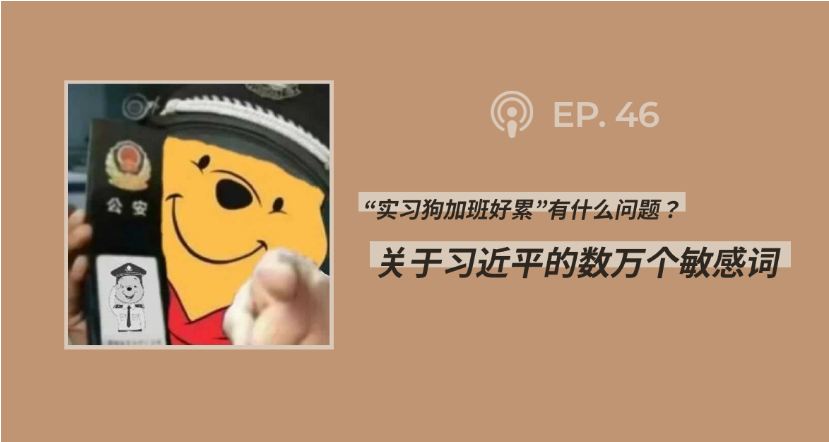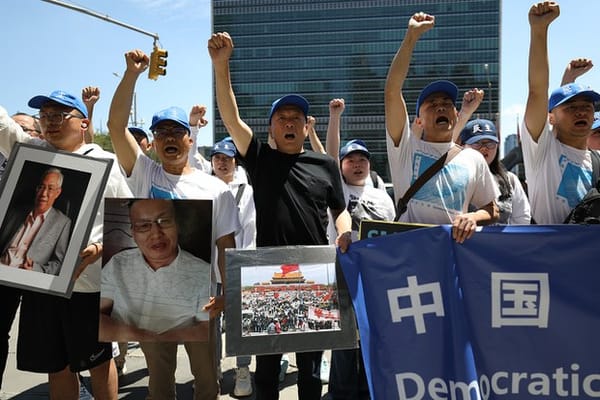What's wrong with "the intern dog is tired after working overtime"? Tens of thousands of sensitive words about Xi Jinping

When you finish a hard day's work and come home from the company at 9pm, you are ready to complain on Weibo: "The intern dog is so tired after working overtime", but you find that this complaint cannot be posted because it "violates relevant laws and regulations." This magical scene is a real experience of a Weibo netizen on December 11, 2018. The reason behind it is that the word "Xi Dog" in "Intern Dog" triggered the censorship of sensitive words about Chinese President Xi Jinping. .
Xi Jinping is all sensitive
Censorship of sensitive words is a common online experience for Chinese netizens. The censorship of sensitive words involving leaders has become even more stringent. As China’s supreme leader, Xi Jinping’s number of related sensitive words has reached an astonishing level. According to statistics, in the inventory dictionary issued to LeTV Video by the State Council Information Office in August 2016, there were as many as 35,467 sensitive phrases related to Xi Jinping. In addition, in recent years, the constitutional amendments to abolish term limits, Sino-US trade war, Hong Kong's anti-extradition bill, the new coronavirus epidemic, etc. Every major event that occurs makes this sensitive word vocabulary more "full".
For the complete list of Xi Jinping sensitive words issued by the State Council Information Office to LeTV, please see the Xi Jinping Sensitive Word Database of the State Council Information Office
In addition to being numerous in number, the types of these sensitive words are also extremely wide, ranging from homophonic names to job titles, from typos said by Xi Jinping to Xi-style "golden sentences" promoted by official media. They are all on the list. Some sensitive words are so ridiculous that they may even appear to be "advanced blackmail." In January 2018, a netizen uploaded a recipe on a cooking app, but was censored because the word "wash the pan" in the expression "wash the pan" has a homophone with Xi Jinping, and the recipe could not be uploaded.
Homophones, made-up words, dish names, mispronunciations: Thousands of types of sensitive words
We roughly divide these strange and sensitive words about Xi Jinping into three categories.
The first category is various phrases related to Xi Jinping’s name, which is also the largest category. The various homophones of the three characters Xi Jinping have been carefully scrutinized. Various similar characters of the three characters Xi Jinping, such as the word "diao" for "diaoman" which is similar to the word "xi", and the word "dog" which is similar to the word "big" for "Xi" ", "Tai" and other characters are also highly sensitive. Even the word "cui" in "emerald green" is often blocked because the upper and lower structure is "xi xizu", which is considered to be used to curse Xi Jinping's death. In addition to the name itself, Xi Jinping, his position, nicknames plus various prefixes and suffixes are also the focus of scrutiny, from "Chairman" and "General Secretary" describing his formal positions to joking "General Xi" and "Boss" ", etc., are all high-level sensitive words.
The second category of sensitive words is related to his growth experience before becoming the top leader of the Chinese Communist Party. For example, Xi Jinping did not complete junior high school because of the Cultural Revolution. Later, he was qualified to enter Tsinghua University by virtue of his status as a worker, peasant, and soldier student. As his career progressed, he completed a "part-time doctorate" experience. In the ridicule and ridicule of netizens, sensitive words such as "junior high school student", "elementary school student" and "elementary school doctor" were born. Another representative incident comes from Xi Jinping’s recollections of his time in rural areas during the Cultural Revolution during an interview in his early years. "Carrying two hundred kilograms of wheat without changing shoulders on a ten-mile mountain road" was considered by many netizens to be contrary to common sense and boastful, thus giving birth to blocked words such as "carrying wheat man" and "two hundred kilograms".
When Xi Jinping was young, he worked in the queue in Liangjiahe Village for seven years. In 1985, Xi Jinping, then deputy mayor of Xiamen City, communicated with college students at Xiamen University and said, "The seven years I spent in Liangjiahe happened to be the time you spent in high school and college combined. I went to high school in Liangjiahe. , Liangjiahe University”. These two sentences were later officially adopted as Xi Jinping's classic sentences to inspire young people, and were quoted and promoted many times. But when netizens use "Liangjiahe University", "Liangjiahe Library" and other related expressions to ridicule Xi Jinping, these expressions have become sensitive words.
The third category of sensitive words is related to events and controversies during Xi Jinping’s administration. Xi Jinping made typos in various public occasions, such as referring to King Gesar as "King Sagar", referring to easing trade and easing agriculture as "opening commerce and easing clothes", and misreading per capita GDP as "per capita income of 80 million". "Dollars", pronouncing "exquisite" as "excellent" and "support" as "paying homage" will trigger ridicule from netizens, and the word will immediately become a sensitive word. In 2013, Xi Jinping went to Beijing Qingfeng Baozi Restaurant for lunch, and thus received nicknames such as "Xi Baozi" and "Qingfeng Emperor". Naturally, these nicknames have become sensitive words. Beginning in 2017, the animated character Winnie the Pooh was suddenly banned. It was speculated that some netizens used the image of Winnie the Pooh to poke fun at Xi Jinping, who has a similar figure. This absurd blocking behavior triggered a large number of secondary creations by netizens and accelerated the spread of this meme. The whole world connected Xi Jinping’s personal image with Winnie the Pooh. Some related words, such as "Puff Bear", "Honey Jar", "Xi Puff", etc., also quickly joined the growing list of sensitive words.
From brother-in-law to becoming emperor
Every time there is an event or scandal that triggers strong controversy, sensitive words related to Xi Jinping will produce a wave of explosive growth. Two of the most iconic events are undoubtedly the 2016 Panama Papers scandal and the public controversy caused by amending the constitution in 2018 to abolish term limits. In 2016, the International Consortium of Investigative Journalists exposed the "Panama Papers", which involved the family property status of many political figures around the world, triggering an uproar in public opinion around the world. Many high-level dignitaries of the Chinese Communist Party are also on the list. The most important one is Xi Jinping's brother-in-law Deng Jiagui, whose offshore assets were exposed in the "Panama Papers". As a result, the word "brother-in-law" once became a hot search topic on Weibo. This incident triggered large-scale censorship. Searches related to "brother-in-law" were not only blocked on Weibo and Zhihu, but even "Panama" was "implicated". Words such as "Panama Canal" and "Panama Canal" that are similar to "Document" were once added to the list of sensitive words.
In February 2018, Xinhua News Agency broadcast the CCP's proposal to amend the constitution, revealing to the outside world for the first time the removal of presidential term limits, triggering a large amount of online discussion. Netizens expressed their anger at the abolition of term limits in various ways. The words "my emperor", "long live", "enthroned", "proclaimed emperor", "encouraging advancement" and other words were all blocked. To borrow related words from Yuan Shikai's irony of proclaiming emperor " Words such as "Yuan Shikai", "restoration", and "Reform of 1898" have also been censored, and even "immigration" has become a sensitive word. On that day, folk satirical creativity battled with official censorship. When Chinese homophonic words were highly banned, some netizens began to use English. However, English sensitive words also rapidly expanded from corresponding words related to the constitutional amendment incident. During the peak "tower rush" period of several hours that day, all Weibo posts containing the English letter "N" could not be sent. This incident also led to a surge in the number of sensitive words related to Xi Jinping.
The process of increasing Xi Jinping’s sensitive words is just a microcosm of China’s Internet censorship in recent years. Along with the increasing number of sensitive words, is the height of the Great Internet Firewall; and in the tug-of-war with the censorship of sensitive words, netizens are constantly creating new expressions and constantly trying to tear down this high wall.



